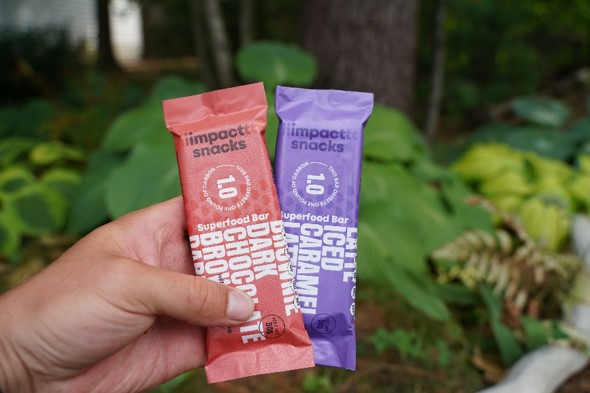This week, I talked with Corey Nobile, the Founder of Impact Snacks, to discuss their approach to sustainable food and practices. Impact Snacks was founded in 2016 and recently launched after a highly successful Kickstarter campaign that was completely funded in just 13 hours after going live.
Their primary focus is to change the way people look at everyday snacking by creating a 100% plant-based superfood bar that reclaims more carbon than it makes and produces no plastic.
This solution is needed for the future, as single-use plastics pollute our landfills and oceans, and they can take up to 1000 years to decompose. For perspective, 1.3B tons of plastic waste are estimated to be thrown away over the next 2 decades (without intervention).
How did Impact Snacks start?
The first phase of Impact Snacks began by making protein and entering high school business competitions. And then it started evolving from a hobby that was supported by friends and family into a real business. And when we went to college, it started taking form in a way that we didn’t think it would.
At the same time, we were learning about new environmental sustainability, and before that we didn’t really know much about it. We also didn’t totally understand what a carbon footprint was, and just how bad single use plastic was for the environment.
How did Impact Snacks get to where it is at today?
We started with making protein, roughly 4 years ago, and we were working on that for 2 years. When we transitioned to Impact Snacks, the learning curve was different.
It’s really hard to make a good sustainable, as CPG is usually a volume play with low margins. Adding a substitute for single-use plastic onto that added another layer. This took a lot of time and connecting with the right people.
This piece was critical for us. We recognized the consequences of single-use plastics and we wanted to prove that we didn’t need plastics. We tested various solutions and figured out different ways that we could deliver the same functionality of plastics while being compostable, edible, and natural. This became a huge part of our mission.
Why did you go the route of crowdfunding on Kickstarter?
We really like the idea of reward crowdfunding, especially for new products. It allows you to gauge volume, demand, manufacturing, and logistics without having the pressures of a 2-3 day shipping time. And on the business side, we have solid margins because marketing and growth is all organic (with little to no customer acquisition costs).
Also, when you launch on Kickstarter, people back you because they believe in your mission. It’s an incredibly powerful thing – there’s no economic incentive for them, and they really just want to be a part of what you’re building. They recognize that it’s early, they recognize that you need to climb a mountain, but they’re willing to prop up their hard-earned money anyways.
Can you tell me a little bit about your perspective on the ecosystem?
Our true north is building an ecosystem around sustainable consumer goods. We are vertically across the board, whether it be with our emissions program or ingredients. If we can make a modularized, circular supply chain, when it comes to making other consumer goods, in-house or not, it’s going to be a lot easier to bring more sustainable CPGs to market. We want to bring it to a point where it actually makes more sense and it is cheaper than linear supply chains and traditional methods.
On the customer side of the ecosystem, we want to get them excited about what we are doing and build a following.
On the business side, we want to educate companies so that they know it’s possible to do the right thing and still profit. Once we have their attention, we can help them adopt some of our practices and build a family of brands that are going to create a positive impact.
What does the future look like?
History books are going to look at our current economic system, like linear supply chains as antiquated. The idea that we don’t treat waste as a resource is ludicrous. It’s not just a burden on our planet, but it’s an economic a burden as well. The ripple effect of fixing this will be tremendous.
Legislation is going to be a big piece, and this will likely look similar to the way California just banned gasoline-fueled car sales by 2035.
However, my personal philosophy is that innovation will need to lead this. There are going to be companies that make such good sustainable products, that they compare to their unsustainable competition. I think that investment in the space is going to get to the point where cleantech is just as advanced such that there will be no compromises in quality or products.
But we will be able to encourage certain companies to adopt circular supply chains and move in the right direction.
Outlook
Impact Snacks taking a holistic approach to sustainable products is setting the bar of expectations high for other companies to follow. Their life cycle analysis and verification is gold. It is likely that other companies will adopt this methodology as they transition to more sustainable supply chains. Considering that consumers drove supermarkets to provide organic options, eco-friendly food and products will be the next fad. Speaking of which, Amazon just launched Climate Pledge Friendly, which is a new program that highlights products for customers that meet sustainability standards and help preserve the natural world. Consumers are starting to and will continue to care about a product’s carbon footprint and sustainability practices.
About The Author

Daniel currently works at Lawrence Livermore National Laboratory. His original assignment was to maintain and update facility safety documentation for all facilities on-site, and perform risk analysis. Over time, his role has expanded to leading continuous improvement efforts through product management.
Concurrently, Daniel volunteers with Techstars, helping organize startup weekends, and with the American Institute of Chemical Engineers, organizing events on the local and national levels of the organization. He also volunteers with One World, and previously with Powerhouse Ventures, to source and screen startups for potential investment.
Daniel holds a BS in Chemical Engineering from UC Davis, and recently completed coursework in energy innovation from Stanford. His passion is at the intersection of sustainability, innovation, and business.

